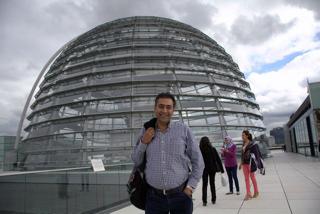Event reports
For most of them it was the fist visit to Germany. “I come from a small country. For me it is very complicated to understand the political system, but I like that here many people are involved in decision making through the Bundestag (Federal Parliament) and the Bundesrat” states the PR-Manager Ramez Fawadla. “We Palestinians can learn a lot from Germany”, he believes, “in particular the discipline without anything would work, but also about economy and nature protection.”
Within the group, one can notice a special tension. In September, Palestine wants to become a member of the United Nations which would mean for them to come one step closer to becoming an independent state. How does the German state works? Would that be applicable to a Palestinian state? Many of their questions seem to circle around this matter.
But also Berlin itself is thrilling for them. “I like this city very much, the diversity, so many people are here, so many faces from different nations, and it is very green and everything is very well organized”, raves Nida Ibrahim. She had been to Germany before. “But each time I see it differently. This time it is the first time that I get some insight in the functioning of the political institutions. It is different when someone explains that to you in the Bundesrat.” There, many immediately go to the speaker’s desk and pose statesmanlike for the camera. Once they climbed the rooftop of the Bundestag, they don’t want to leave. They keep asking questions. They discuss the Mohammad caricatures, political taboos and foreign policy.
The group will be staying in Berlin until July 31st. They will visit the Kanzleramt (the building housing the Chancellor’s Office), talk to journalists of the international broadcaster Deutsche Welle and RTL, a German private television station, visit Cecilienhof Palace in Potsdam and roam the capital after the official part of the day is over. And they still have plenty of questions to ask. “I want to learn more about the federal states and their culture and traditions”, hopes Ramez. “I want to know more about the emancipation of women in Germany”, says Nida. “I heard that in the sixties they still had to ask their husbands for permission when they wanted to work. I want to know how that changed and how we can learn from the German experience. After all, your Chancellor is a woman.”





